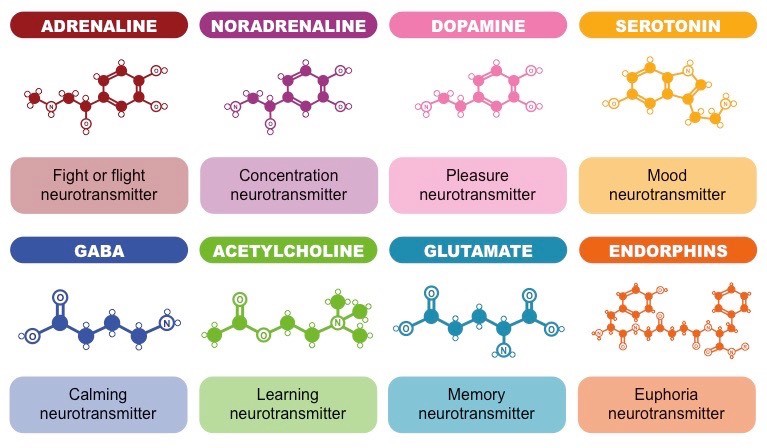 Balance Your Brain
Balance Your Brain
Natural ways to balance neurotransmitters and improve your mind and mood
By Steven Horne, RH (AHG)
At this very moment, the trillions of cells in your body are talking to each other. They are
not conspiring against you; they are actually trying to help you by attempting to keep your body
functioning at its best. Your cells are talking to each other using three types of chemical messengers: eicosonoids, hormones and neurotransmitters. Neurotransmitters are the messengers
of your nervous system. Your nerve cells (neurons) use them to communicate with each other
and with other body tissues, such as your muscles and senses.
You are probably familiar with some of these messengers, such as
serotonin, which has become
well-known for its role in depression.
Other neurotransmitters include endorphins, dopamine,
GABA, epinephrine and norepinephrine. Modern psychiatry focuses heavily on the modification of neurotransmitters through various drugs that stimulate or Inhibit them to treat mood
disorders like anxiety and depression, as well as various forms of mental illness.
Unfortunately, these drugs are a rather crude way to balance neurotransmitters. Barry
Jacobs, a neuroscientist at Princeton University has said, "
So far, the tools used to manipulate
serotonin in the human brain are more like pharmacological machetes than they are like scalpels, crudely effective but capable of doing plenty of collateral damage." We call that collateral
damage, side effects.
The good news is that there are natural methods to get your brain cells communicating in
healthy ways. These include improved nutrition, specific herbs and nutritional supplements,
counseling, flower essences, aromatherapy and lifestyle modifications. These natural methods
can help build permanent improvement in brain function without the harmful side effects of
synthetic drugs. So. in this issue of Sunshine Sharing we shall discuss the functions of the major neurotransmitters and offer natural solutions to optimize their function.
 General Tips for Neurotransmitter Balance
General Tips for Neurotransmitter Balance
To understand how the body manufactures neurotransmitters, think of the following formula:
amino acids (from protein) + vitamins & minerals neurotransmitters. The high carbohydrate
diets of most Americans, coupled with a lack of quality protein, vitamins and minerals is a
major factor in the rise in depression, anxiety and other disorders that signal imbalances in
neurotransmitters.
Amino acids, from properly digested proteins are the building blocks of all neurotransmitters. Amino acids necessary for neurotransmitter production include tryptophan, tyrosine,
phenylalanine, glutamate, glycine and glutamine. Vitamins, most notably vitamin C and the
B-Complex vitamins (especially B6) and minerals like zinc, copper and magnesium are critical
to the process of converting these amino acids to neurotransmitters.
So, if you suffer from irritability, depression, anxiety. excessive sadness and other imbalances
of mood, or you have problems with memory concentration, learning, balance, coordination or
other nervous system imbalances, the place to start is with a better diet. Make sure you get quality
protein in your diet every day. Eat nutritionally dense foods like whole grains, nuts, seeds, fruits
and vegetables and avoid refined sugars stimulants like caffeine and processed vegetable oils.
Many people have found that supplementing their amino acids by taking either Free Amino Acids or Super Algae that they
have a more stable brain function and mood. Taking Balanced B
Complex or Nutri-Calm (which contains the B-complex vitamins
and vitamin C) will give your body nutrients it needs to turn these
amino acids into neurotransmitters.
The balance between copper and zinc in the body is very important to neurotransmitter balance. Copper helps in the production
of the more stimulating neurotransmitters, while zinc is essential to
the production of more calming ones. So, if you tend to feel angry
irritable, anxious or nervous, you probably need to avoid copper
supplements and increase your intake of zinc. Magnesium is also
critical to brain function and a majority of Americans are deficient.
If you tend to feel tense, nervous and "on edge," increasing your
magnesium intake with Magnesium Complex may be helpful.
Good fats are also essential to healthy brain function. So, in
addition to avoiding processed fats like refined vegetable oils,
margarine and shortening, increase your intake of good fats like
fatty fish, nuts, seeds, avocados, eggs, butter and coconut oil. You
may also find it helpful to supplement with Super Omega-3 EPA or even DHA, which is the most prevalent fatty acid in the brain.
An unhealthy lifestyle is going to result in imbalances in neurotransmitters, so make sure that you stay adequately hydrated, get
sufficient sleep and get some kind of regular physical activity. It is
also important to keep your mind focused on the positives rather
than the negative. This means focusing your mind on what you
want to do that is constructive and good, and taking your mind
off of what you don't want and don't like. All of these healthy
activities will help keep your neurotransmitters and your brain
balanced. You can also try some of the more specific supplements mentioned in this article (Brain boosters) and this article about memory.


